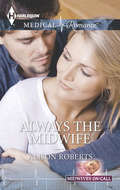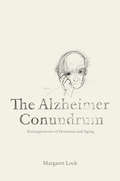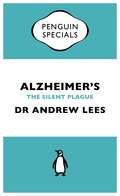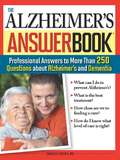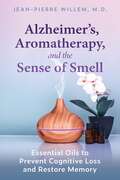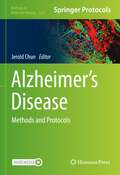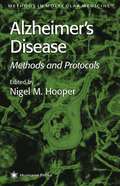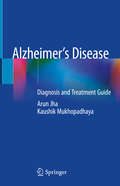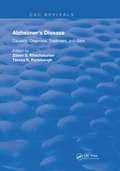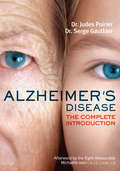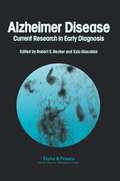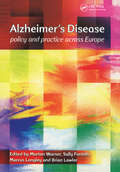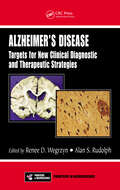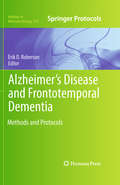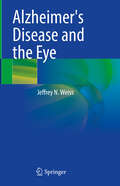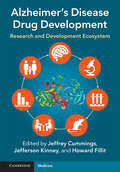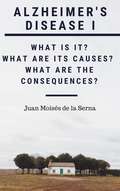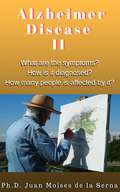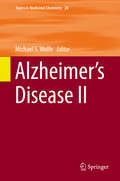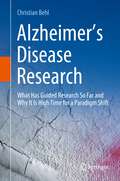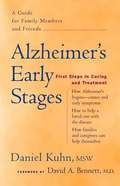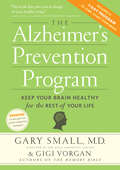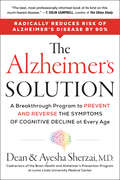- Table View
- List View
Always the Midwife
by Alison RobertsThe perfect midwife... Dedicated midwife Sophia Toulson always has a baby to hold-it's a special part of her job that helps her cope with her infertility. But sometimes a girl just wants to have fun-and hunky motorbike-riding paramedic Aiden Harrison has the perfect proposition... The perfect fling! Aiden devotes his life to his injured brother and his patients-he never dates a woman more than three times. Sophia should be his ideal fling...but he soon realizes that three dates may never be enough!
The Alzheimer Conundrum: Entanglements of Dementia and Aging
by Margaret LockWhy our approaches to Alzheimer's and dementia are problematic and contradictoryDue to rapidly aging populations, the number of people worldwide experiencing dementia is increasing, and the projections are grim. Despite billions of dollars invested in medical research, no effective treatment has been discovered for Alzheimer's disease, the most common form of dementia. The Alzheimer Conundrum exposes the predicaments embedded in current efforts to slow down or halt Alzheimer’s disease through early detection of pre-symptomatic biological changes in healthy individuals.Based on a meticulous account of the history of Alzheimer’s disease and extensive in-depth interviews, Margaret Lock highlights the limitations and the dissent associated with biomarker detection. Lock argues that basic research must continue, but should be complemented by a public health approach to prevention that is economically feasible, more humane, and much more effective globally than one exclusively focused on an increasingly harried search for a cure.
Alzheimer's: An Essential Guide to the Disease and Other Forms of Dementia (Penguin Specials)
by Dr Andrew LeesA short, easily understandable account of Alzheimer's, by world expert Dr Andrew LeesBritain like the rest of the developed world is in the grip of a silent plague. Its thousands of victims can no longer make sense of the world and are contained for their own safety in fading Victorian piles and nondescript redbrick detention centres around the country. For them the present is a foreign country and the past a lost continent.There are now more people in the UK with Alzheimer's than the population of Liverpool, and four million Americans are reported to have the disease. Longevity is a major factor in the increasing incidence of the disease, with the number of over 65s in the UK having trebled in the last 100 years, and forecast to double again in the next 25 years. With such an alarming background, the race to find the causes - and therefore potentially a cure - for Alzheimer's is urgent. In this Penguin Special, Dr Andrew Lees, a world expert on the neurodegenerative diseases explains what we know, and don't know, about Alzheimer's and its amelioration. Dr Andrew Lees is Professor of Neurology at the National Hospital for Neurology and Neurosurgery, London, and Clinical Director of the Queen Square Brain Bank for Neurological Disorders. His major scientific research has been carried out in the field of dementias and Parkinson's disease. A native of St Helens, Lancashire, he lives in north London.
Alzheimer's Answer Book
by Charles AtkinsIs Alzheimer's disease hereditary? Are there memory exercises I should be doing now? Is all dementia Alzheimer's, or are there other forms? How do I make time for both my parent with Alzheimer's and my children? How long can someone live with this disease? All caregivers and families touched by Alzheimer's and dementia face a seemingly overwhelming number of emotional decisions. The Alzheimer's Answer Book serves as a much-needed resource for you in this difficult time and is full of the sound advice and immediate guidance you need. Written by an experienced doctor who began his career as a geriatric psychiatrist, The Alzheimer's Answer Book covers such topics as: * What are the causes of Alzheimer's and dementia * What preparations do I need to make immediately after diagnosis? * Are there medications available that help slow the progress of the disease? * How can I tell if my parent is in pain? * How can I avoid "caregiver burnout" when I'm constantly caring for a parent? * Where can I find resources and support in my community? * What are the differences between Medicare and Medicaid, and how do I know what insurance will and will not cover?
Alzheimer's, Aromatherapy, and the Sense of Smell: Essential Oils to Prevent Cognitive Loss and Restore Memory
by Jean-Pierre Willem• Cites multiple clinical studies to show how Alzheimer&’s is critically bound with the sense of smell and how the loss of this sense is often the first symptom of onset • Details how to use essential oils to stimulate memory, prevent cognitive loss, and counter the isolation, withdrawal, and depression of Alzheimer&’s patients • Reveals the striking results seen in several French hospitals and senior living homes where aromatherapy has been used as a therapy for Alzheimer&’s While there is still no known cure for Alzheimer&’s, new research and trials from France reveal that it is possible to slow its progression, ameliorate some of its effects, and improve the quality of life for those suffering from this degenerative condition, using the sense of smell. Citing years of clinical evidence, Jean-Pierre Willem, M.D., shows how Alzheimer&’s is critically bound with the sense of smell. He explains how the olfactory system is connected to the limbic area of the brain, which holds the keys to memory and emotion and is the area of the brain most severely afflicted by Alzheimer&’s. He reveals how one of the very first signs of Alzheimer&’s is typically the loss of the sense of smell. Sharing the striking results seen in French hospitals and senior living homes where aromatherapy has been used as a therapy for Alzheimer&’s for more than 10 years, Dr. Willem details how to use essential oils to stimulate memory, prevent cognitive loss, and counter the isolation, withdrawal, and depression these patients are likely to feel. He explains how essential oils make a direct connection with the cerebral structures involved in emotion and memory and make it possible for the patient to bring deeply buried memories back to the thinking surface. This allows the patient to recover a portion of their identity, which can become the foundation for additional healing, including regaining the ability to communicate and reducing behavioral issues. Tracing the evolutionary links between smell and taste, he also explores the effects of diet and nutrition on Alzheimer&’s and other forms of dementia, explaining the benefits of raw foods, what foods to avoid, and what supplements can help. Offering a hands-on and medication-free way to help those suffering from Alzheimer&’s, this guide provides a way for Alzheimer&’s patients and their families to recover the joy of living again.
The Alzheimer's Cope Book: The Complete Care Manual for Patients and Their Families
by R. E. MarkinThis manual covers everything from talking about Alzheimer's with your loved ones, to deciding whether nursing or home care is right for your loved one. The author includes several helpful checklists, as well as a bibliography.
Alzheimer's Diagnostic Guideline Validation: Workshop Summary
by Diana E. PankevichScientific advances during the last decade now indicate that Alzheimer's disease is a continuous, progressive cognitive disease, most likely beginning many years before dementia is apparent. To discuss the next steps in validating new diagnostic guidelines for Alzheimer's disease, the IOM Forum on Neuroscience and Nervous System Disorders hosted a public workshop session at the Alzheimer's Association International Conference.
Alzheimer’s Disease: Methods and Protocols (Methods in Molecular Biology #2561)
by Jerold ChunThis volume explores the latest techniques used to study the human brain towards understanding Alzheimer’s Disease and related neurodegenerative disorders. Contributed to by world-renowned experts, the chapters in this book are divided into five parts. Part One discusses human post-mortem brain preparations including single-cell isolation and use of specialized imaging. Part Two talks about neural cellular models using primary and human induced pluripotent stem cells to model aspects of the human brain. Part Three details nucleic acid analyses including transcriptomic and somatic genomic changes, and Part Four discusses lipid analyses via mass spectrometry. Lastly, Part Five covers protein analyses, particularly Aβ and Tau. Written in the highly successful Methods in Molecular Biology series format, chapters include introductions to their respective topics, lists of the necessary materials and reagents, step-by-step, readily reproducible laboratory protocols, and tips on troubleshooting and avoiding known pitfalls.Cutting-edge and thorough, Alzheimer’s Disease: Methods and Protocols is a valuable tool for all researchers who want to expand their knowledge and understanding of this disease and other related dementias.
Alzheimer's Disease: Methods and Protocols (Methods in Molecular Medicine #32)
by Nigel M. HooperA panel of highly skilled investigators describe in detail their state-of-the-art biochemical, cell biological, and molecular biological techniques for studying the molecular basis of Alzheimer's disease. These readily reproducible, step-by-step methods focus on work with the amyloid precursor protein and the amyloidogenic peptide Aß, but also include-with the recent identification of presenilin proteins-techniques for determining the structure and biological function of these proteins. In addition, there are chapters covering the tau protein and its role in Alzheimer's disease, as well as an introductory discussion of the history of the disease, its genetic basis, and the currently available and possible future therapeutic agents. Cutting-edge and wide ranging, Alzheimer's Disease: Methods and Protocols provides ready access to proven, reproducible methods for elucidating the molecular basis of this most common senile dementia.
Alzheimer’s Disease: Diagnosis and Treatment Guide
by Arun Jha Kaushik MukhopadhayaThis book provides a practically focused resource on the methodologies available for diagnosing and treating Alzheimer’s disease. The number of individuals affected by the disease continues to grow and as such there is an ever-increasing need for clear easy-to-digest guidance on how to appropriately diagnose and treat these patients. Within this work, chapters provide concise informative details of what this form of dementia is, how it can be diagnosed, managed and prevented making it ideal for those with limited experience in dealing with these patients. Information is provided on how to use a variety of the latest relevant techniques including mental state examinations, functional assessments, special investigations and the available drug treatments. Alzheimer’s Disease: Diagnosis & Treatment Guide is a concise clinical guide detailing how to diagnose and treat these patients. It’s easy-to-follow ideal for use by front-line physicians and trainees, who have no previous experience of diagnosing and treating this disease. The assessment component of the book is based on the WHO Mental Health Gap Action Plan (mhGAP) Dementia Intervention Guide for non-specialized settings.
Alzheimer's Disease: Cause(s), Diagnosis, Treatment, and Care (Routledge Revivals)
by Zaven S. Khachaturian Teresa S. RadebaughPublished in 1996: Alzheimer's disease is characterized by memory disturbances and changes in personality and is associated with aging, although it can occur in people under 65. It is a progressive disease, painful to witness as the patient's health declines. Alzheimer's Disease: Cause(s), Diagnosis, and Care, with its complete and authoritative discussions, will help you understand all facets of this complex disease. This book addresses a broad spectrum of topics ranging from diagnosis, causes, treatment, epidemiology, genetics, risk factors, and care and management. Alzheimer's Disease: Cause(s), Diagnosis, and Care is intended for a diverse audience, including practitioners and students, family members, and everyone who is concerned about this disease.
Alzheimer's Disease: The Complete Introduction
by Dr Judes Poirier Dr Serge Gauthier Barbara Sandilands André Chagnon The Right Honourable Michaëlle JeanA guide for caregivers and sufferers coping with Alzheimer’s. Alzheimer’s disease is a reality in millions of lives and a serious concern for seniors and their loved ones. In developed countries where people are living longer than ever before, the incidence of Alzheimer’s is reaching epidemic proportions, according to the World Health Organization. For families, sufferers, and caregivers, the need for reliable, clear, and concrete information has never been greater. Alzheimer’s Disease: The Complete Introduction is a comprehensive guide to the disease and its effects: getting a diagnosis, the ways it can progress and be managed, strategies for supporting sufferers and accessing care, legal concerns, and more. This guide addresses every aspect of the disease from the first doctor’s visit to the long-term measures that can drastically improve the lives of sufferers and those close to them. Inside, you will find: Practical and comprehensive information to guide every step of the process of seeking treatment or a diagnosis A reassuring, realistic guide for family members, caregivers, and patients themselves Answers to the most commonly asked and most pressing questions about Alzheimer’s Detailed and clear chapters on the lifestyle habits that may aid in preventing and managing Alzheimer’s Written by two medical experts, this guide is intended for all. It aims to demystify the disease and provide a clear path to reclaiming stability and quality of life. Finally, it explains the real progress that has been made over the past five years in treatment and prevention.
Alzheimer's Disease: Current Research In Early Diagnosis
by Robert E. Becker; Ezio GiacobiniThis book examines the relevance of current research for the early diagnosis of Alzheimer disease. It uncovers the present lack of clinical utility in research methodologies such as neuroimaging, drug challenges, electroencephalographs studies, and brain biopsy.
Alzheimer's Disease: Policy and Practice Across Europe
by Morton Warner Sally Furnish Marcus Longley Brian LawlorAlzheimer's disease is becoming more common in Europe, with significant human, ethical, economic and professional challenges to society. This book examines clinical practice and service delivery, and identifies policy issues that could lead to improved quality of life for sufferers and carers. The book: • Describes the differing needs of sufferers and carers, and how they can be met by a co-ordinated approach to policy and implementation • Outlines the particular challenges that healthcare policy makers face for this disease • Shows how better models of service provision can be developed and describes best practice models • Discusses the lessons to be learnt from various European pioneering projects This is a concise and practical guide for clinical specialists including psychiatrists, geriatricians, neurologists, public health doctors, nurses, and policy makers and shapers in health and social services.
Alzheimer's Disease: Targets for New Clinical Diagnostic and Therapeutic Strategies (Frontiers in Neuroscience)
by Renee D. Wegrzyn Alan S. RudolphIn recent years, a tremendous amount of effort has been focused on better understanding the fundamentals of Alzheimer's disease (AD) to facilitate early and accurate diagnosis and appropriately targeted therapeutic treatments. Alzheimer's Disease: Targets for New Clinical, Diagnostic, and Therapeutic Strategies provides a detailed synopsis of the c
Alzheimer's Disease and Frontotemporal Dementia: Methods and Protocols (Methods in Molecular Biology #670)
by Erik D. RobersonAlzheimer's disease and frontotemporal dementia, two of the most prevalent neurodegenerative diseases, are dreaded disorders that attack the neural networks underlying memory and personality, systems that make us who we are. Major breakthroughs in recent years have spurred new research approaches to these conditions. In Alzheimer's Disease and Frontotemporal Dementia: Methods and Protocols, expert investigators bring together the many divergent areas of expertise used to study these diseases, including behavior, electrophysiology, confocal microscopy, and hardcore biochemistry. Beginning with an overview of the two diseases and contemporary research on them, the book continues with specialized protocols for working with amyloid-β peptide, tau, and apolipoprotein E as well as experimental systems for studying AD and FTD, including cell and animal models, and outcome measures that can be used to assess neuronal function in these systems. Written in the highly successful Methods in Molecular BiologyTM series format, chapters include brief introductions to their respective topics, lists of the necessary materials and reagents, step-by-step, readily reproducible laboratory protocols, and notes on troubleshooting and avoiding known pitfalls. Authoritative and easy to use, Alzheimer's Disease and Frontotemporal Dementia: Methods and Protocols serves as an ideal guide for all scientists pursuing the cause and cure of these widespread and nightmarishly debilitating disorders.
Alzheimer's Disease and the Eye
by Jeffrey N. WeissThis book is a compendium of the worldwide studies of Alzheimer’s disease utilizing the eye as a biomarker, or as a treatment method, that are registered with the United States National Institutes of Health website, clinicaltrials.gov. Clinicaltrials.gov is the largest listing of research studies in the world. The study titles are provided, as is the country of origin and the Clinical Trial Number in order to make it easier for the reader to locate the study and obtain further information. New drug development is costly and time consuming. If through the use of biomarkers, study durations and research costs decrease, there is a greater possibility of a new and effective drug to treat this devastating disease. The eye offers the possibility of early diagnosis and of treatment. Alzheimer’s Disease and the Eye is a valuable resource for ophthalmologists, optometrists, other physicians, and researchers.
Alzheimer's Disease Drug Development: Research and Development Ecosystem
by Jeffrey Cummings Jefferson Kinney Howard FillitAlzheimer's Disease (AD) is a growing global public health challenge. The development of new therapies is urgently needed, and a complex ecosystem of organizations has grown to facilitate AD drug discovery and development. Masterfully collating information on the drug development ecosystem, this book emphasizes the contributions of each aspect in the pipeline with a uniform approach to chapters, enabling readers to access relevant information quickly. Topics covered include the use of non-clinical laboratory studies, biomarker development, artificial intelligence, design and management of clinical trials, and funding and financing models. Also discussed is the critical role of advocacy fundraising for drug development. With the approval of aducanumab, the function of the ecosystem has become apparent. This is a definitive overview of how the ecosystem works in transferring an AD drug from its discovery in the laboratory through clinical trial testing to regulatory review and eventual marketing.
Alzheimer's Disease I
by Juan Moises de la Serna Adriana Ethel AllendeWhat is it, what are its causes, what consequences does it entail? Discover all the answers to Alzheimer's disease. Alzheimer's is a disease that has increased in terms of the number of cases affected in recent years, which in turn has caused many questions to arise when a person or a family member receives the diagnosis, such as, what Alzheimer's is, what its origin is, if there is a treatment, how the disease evolves, what the consequences in everyday life are, what the psychological effects on the patient are, if it can be overcome, if it is transmitted to children. This opens up a whole collection of issues to deal with in order to calm the uncertainty felt when getting to know that one suffers from a disease that is increasingly "common" and widespread, and of which little is known about the latest scientific advances in this area, due in large part to the complexity of the technical language used, but also because these advances usually reach only specialists through meetings and congresses where this type of information is shared.
Alzheimer´s Disease II
by Jacqueline M. Nuñez Juan Moises de la SernaWhat are the symptoms? How is it diagnosed? How many people is affected by it? Learn the latest research about the disease of Alzheimer Every day there are new discoveries about the disease of Alzheimer, but these usually are available for specialists and academics in the topic. This book aims to resolve this problem and show the latest advances about the disease of Alzheimer. Objective: The objective of the e-book is to serve as a first approximation to those people that have in themselves or in their families, the disease of Alzheimer. This book tries to show in a clear way, the results of the latest research about the disease of Alzheimer, and with it , to answer to the most relevant questions, what are the symptoms? How is it diagnosed? And how many people is affected by it? Recipients: -Professionals from the health system that have to, or want to learn more about the diagnosis and treatment of the Alzheimer´s disease. -Professors that want to offer updated information to their students, about the Alzheimer´s disease -To any person that has received the diagnosis of Alzheimer´s disease and their families, for them to know what to do in light of this disease. Topic Following there will be a detailed explanation about each of the principal topics of this piece: -Symptoms of Alzheimer: The families usually are the first ones to notice the symptoms associated with this disease, but for this they should be well informed of which these are. -Alzheimer´s disease: Once the first symptoms have been detected, is adequate to get in touch with an specialist to determine which is the best way to intervene. -Extension of the Alzheimer: Although the number is not the important, since each case is important because is the life of a person, the big numbers inform how this disease is spreading worldwide.
Alzheimer’s Disease II (Topics in Medicinal Chemistry #24)
by Michael S. WolfeMedicinal chemistry is both science and art. The science of medicinal chemistry offers mankind one of its best hopes for improving the quality of life. The art of medicinal chemistry continues to challenge its practitioners with the need for both intuition and experience to discover new drugs. Hence sharing the experience of drug research is uniquely beneficial to the field of medicinal chemistry. Drug research requires interdisciplinary team-work at the interface between chemistry, biology and medicine. Therefore, the topic-related series Topics in Medicinal Chemistry covers all relevant aspects of drug research, e. g. pathobiochemistry of diseases, identification and validation of (emerging) drug targets, structural biology, drugability of targets, drug design approaches, chemogenomics, synthetic chemistry including combinatorial methods, bioorganic chemistry, natural compounds, high-throughput screening, pharmacological in vitro and in vivo investigations, drug-receptor interactions on the molecular level, structure-activity relationships, drug absorption, distribution, metabolism, elimination, toxicology and pharmacogenomics. In general, special volumes are edited by well known guest editors
Alzheimer’s Disease Research: What Has Guided Research So Far and Why It Is High Time for a Paradigm Shift
by Christian BehlThis book highlights the key phases and central findings of Alzheimer’s Disease research since the introduction of the label ‘Alzheimer’s Disease’ in 1910. The author, Christian Behl, puts dementia research in the context of the respective zeitgeist and summarizes the paths that have led to the currently available Alzheimer’s drugs. As the reader is taken through the major developments in Alzheimer's Disease research, particularly over the past thirty years, Behl poses critical questions: Why are the exact causes of Alzheimer's Disease still in the dark, despite all the immense, worldwide research efforts in academia as well as in the pharmaceutical industry? Why has the majority of an entire research field kept focusing on a single hypothesis that establishes the deposition of the amyloid beta peptide in the brain as the key trigger of Alzheimer's pathology, even though this concept has still not been convincingly proven in the clinics? Are there other hypotheses that might explain the pathogenesis of this complex brain disease, and if so, why were these perspectives not adequately followed?In this book, Behl tries to answer these questions. Starting with the historical background, the author illustrates the long and arduous research journey, its numerous setbacks, and the many alternative explanations for the disease, which have started gaining increasing attention and acceptance in the Alzheimer’s research community only more recently. With his deep dive into the history and progression of this research, including the most recent developments, Behl explains why he believes that it is high time to promote a paradigm shift in Alzheimer’s Disease research.The book is written for all researchers in the fields of neurobiology and neurodegeneration, as well as other biomedical fields, who would like to gain a broad and beyond the surface insight into (the key developments of) one of the most promoted research fields of our time. With its extensive literature references and over 100 illustrations, the book is also attractive for students and interested lay persons. Elaborating on all the different aspects and research approaches of this research field, the author aims to convince the reader that the underlying causes of Alzheimer’s Disease may be much more complex than previously thought and that this must be considered for future research directions. While he hopes that the Alzheimer’s research community is finally ready to shed its ‘amyloid-straitjacket’ that has hampered progress for too long, he is also convinced that a much-needed paradigm shift can guide future Alzheimer’s Disease research and provide a new and broader perspective on this age-dependent brain disease.
Alzheimer's Early Stages: First Steps in Caring and Treatment
by Daniel KuhnThe first part of this important book offers a comparison of the normal aging pattern of the brain and what happens with Alzheimer's. It explains the difficulties of diagnosis, risk factors for developing the disease, treatments, and guidelines for prevention. The second part is devoted to practical ways that families can help the patient, including adapting to changing relationships, establishing new ways of communicating and decision making, and planning for the future. The last part offers advice about self-care for family members and helpers, from joining a support group to exploring spiritual resources.
The Alzheimer's Prevention Program: Keep Your Brain Healthy for the Rest of Your Life
by Gary Small Gigi VorganWant to keep Alzheimer’s at bay for years—ideally, forever? Prevention is the way, and this is the guide. Now in paperback and updated throughout, The Alzheimer’s Prevention Program is essential for everyone with a family history of Alzheimer’s, and for the 80 million baby boomers who worry whenever they forget someone’s name. It’s the book that shows how to strengthen memory and avoid everyday lapses. How to incorporate the top ten brain-protecting foods into your diet. How to cross-train your brain, exercising both the right and left hemisphere. And how to reduce stress, a risk factor for developing dementia and Alzheimer’s, through meditation and 11 other relaxation strategies.Written by the New York Times bestselling authors of The Memory Bible, this book is an easy-to-follow regimen based on the latest comprehensive research into Alzheimer’s disease, and especially the critical connection between lifestyle and susceptibility. The paperback edition is updated with a brand-new section that answers the most compelling questions asked of Dr. Small after publication of the first edition, including: the power of exercise to offset a genetic predisposition; antibodies that can clear Alzheimer’s plaques from the brain; and promising new treatments, from drugs to deep brain stimulation.It’s the science-based, breakthrough program that will bring mental clarity to every day and help you take control of your brain’s health.
The Alzheimer's Solution: A Breakthrough Program to Prevent and Reverse the Symptoms of Cognitive Decline at Every Age
by Ayesha Sherzai Dean SherzaiA revolutionary, proven program for reversing the symptoms of Alzheimer's disease and cognitive decline from award winning neurologists and codirectors of the Brain Health and Alzheimer's Prevention Program at Loma Linda University Medical CenterOver 47 million people are currently living with Alzheimer’s disease worldwide. While all other major diseases are in decline, deaths from Alzheimer’s have increased radically. What you or your loved ones don’t yet know is that 90 percent of Alzheimer’s cases can be prevented.Based on the largest clinical and observational study to date, neurologists and codirectors of the Brain Health and Alzheimer’s Prevention Program at Loma Linda University Medical Center, Drs. Dean and Ayesha Sherzai, offer in The Alzheimer’s Solution the first comprehensive program for preventing Alzheimer’s disease and improving cognitive function. Alzheimer’s disease isn’t a genetic inevitability, and a diagnosis does not need to come with a death sentence. Ninety percent of grandparents, parents, husbands, and wives can be spared. Ninety percent of us can avoid ever getting Alzheimer’s, and for the 10 percent with strong genetic risk for cognitive decline, the disease can be delayed by ten to fifteen years. This isn’t an estimate or wishful thinking; it’s a percentage based on rigorous science and the remarkable results the Sherzais have seen firsthand in their clinic.This much-needed revolutionary book reveals how the brain is a living universe, directly influenced by nutrition, exercise, stress, sleep, and engagement. In other words: what you feed it, how you treat it, when you challenge it, and the ways in which you allow it to rest. These factors are the pillars of the groundbreaking program you’ll find in these pages, which features a personalized assessment for evaluating risk, a five-part program for prevention and symptom-reversal, and day-by-day guides for optimizing cognitive function. You can prevent Alzheimer’s disease from affecting you, your family, friends, and loved ones. Even with a diagnosis, you can reverse cognitive decline and add vibrant years to your life. The future of your brain is finally within your control.
